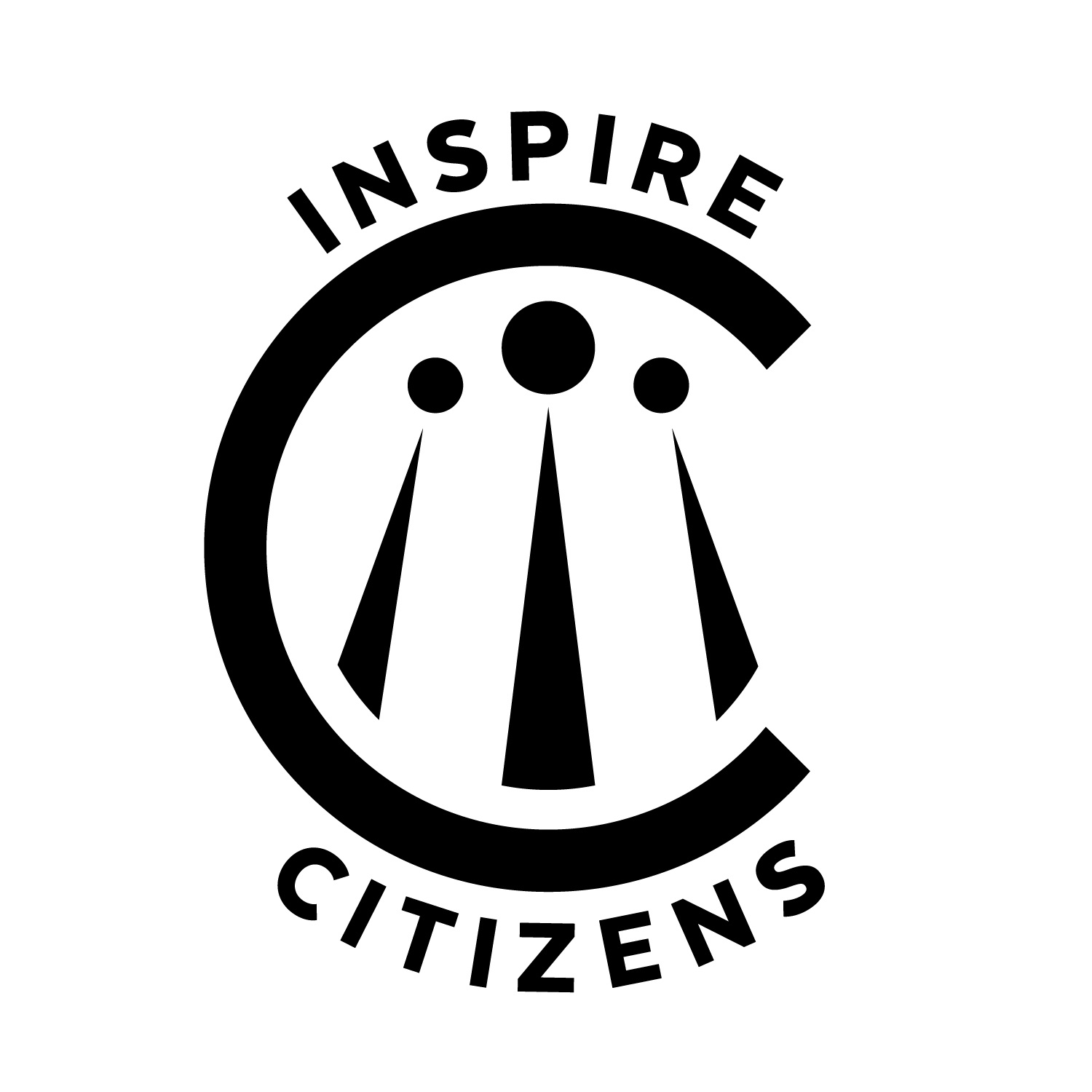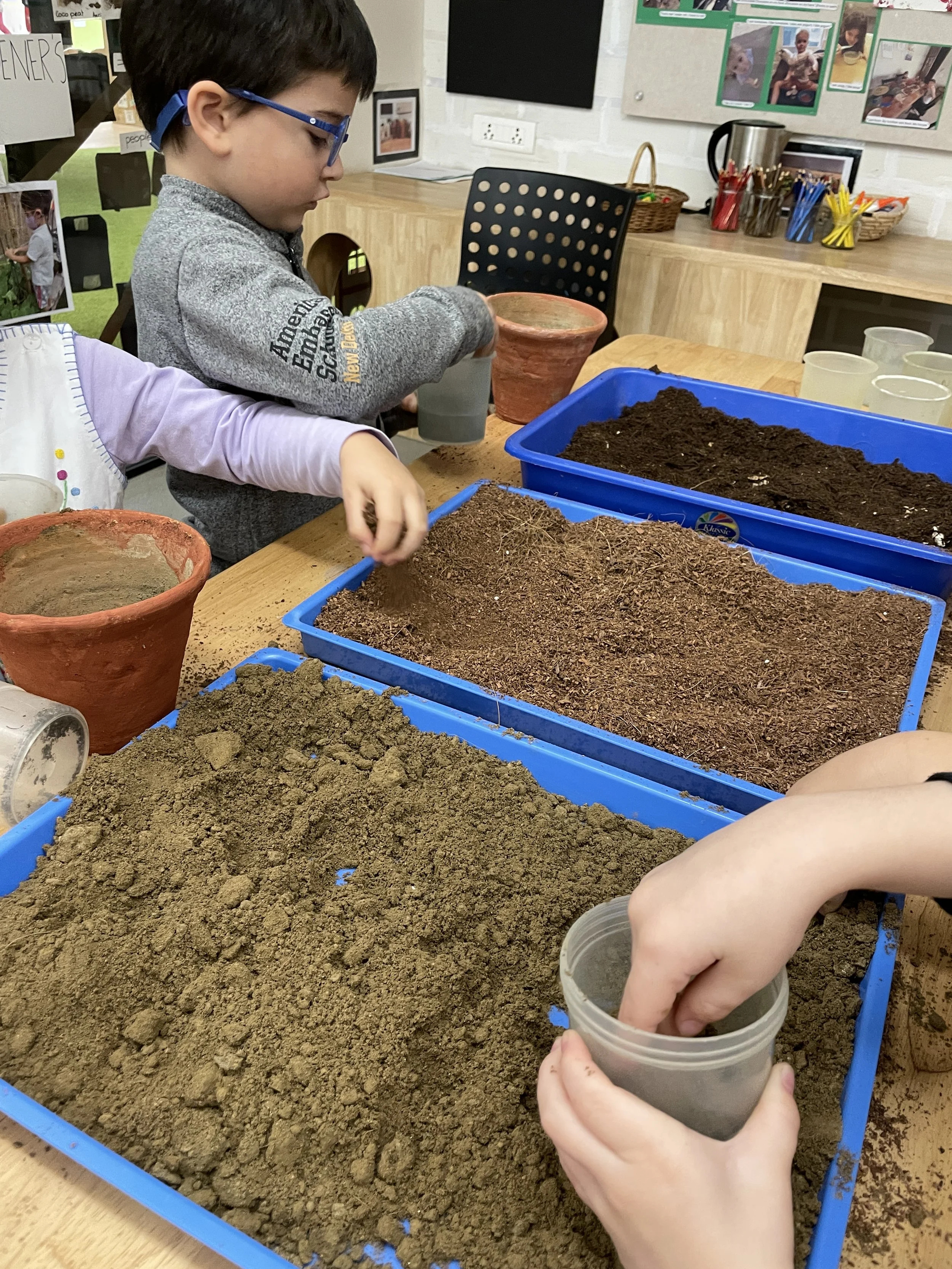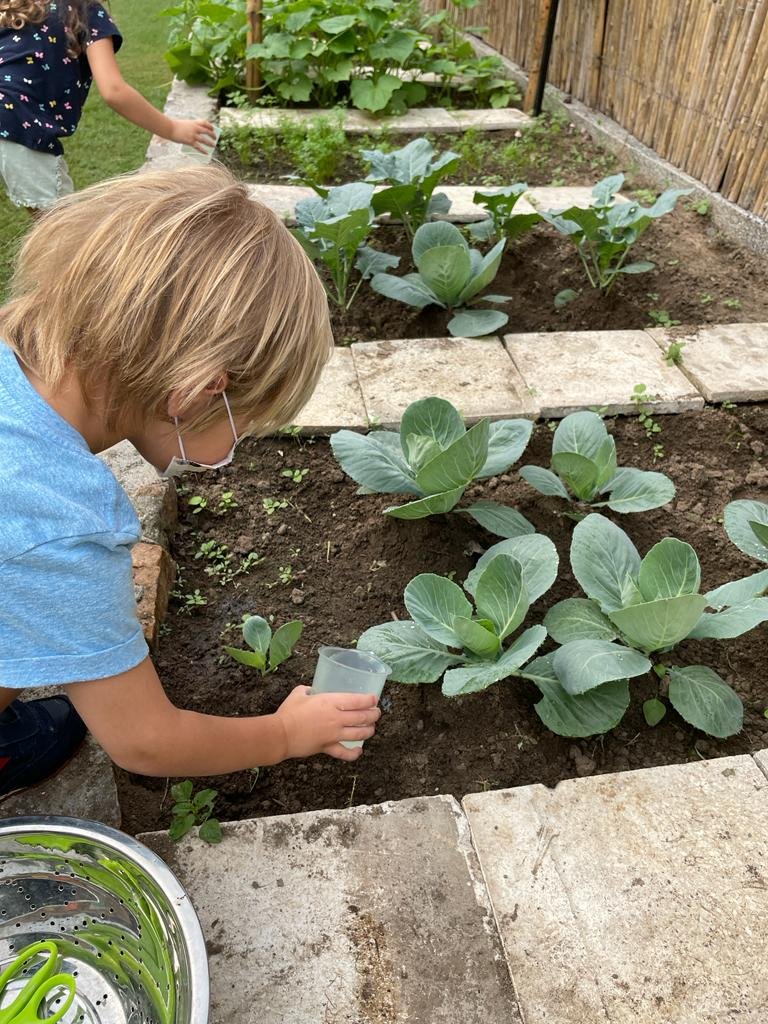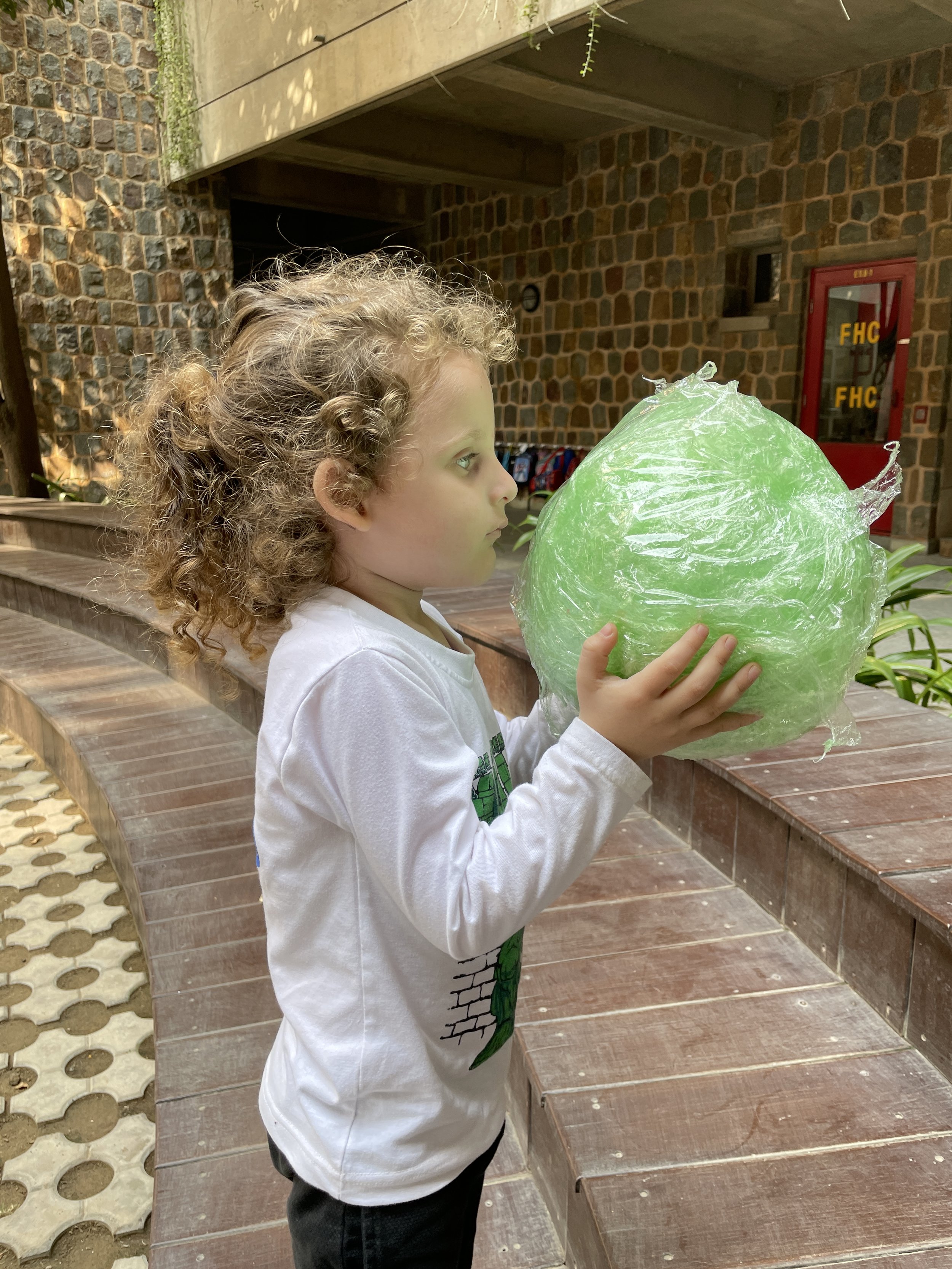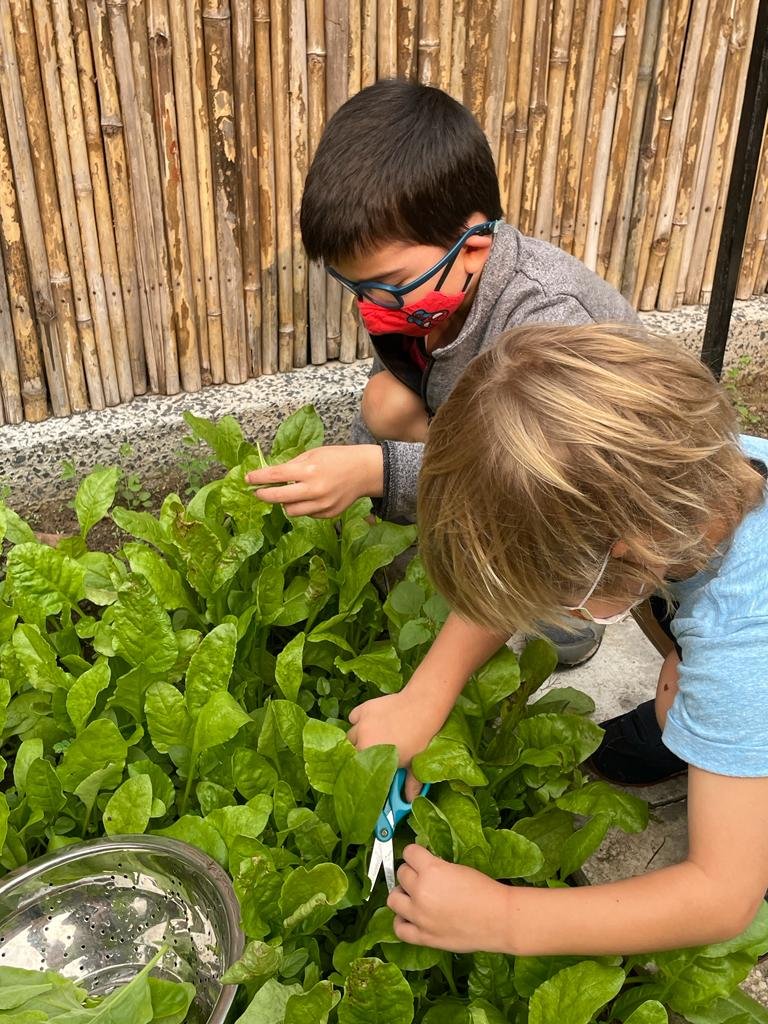Sustainability Education Starts in Pre-K as Students Learn About Food Waste
AES Pre-K students learn about composting techniques.
At the American Embassy School (AES) in New Delhi, a remarkable transformation has been taking place within the Pre-Kindergarten classrooms. Led by dedicated educators and in collaboration with Inspire Citizens, this innovative food waste project has not only changed the way young children think about waste but also fostered a deep sense of empathy and responsibility toward the environment.
During the 2022–2023 school year, Marion Strong and Ruchira Kochar took the lead in driving this project forward. However, the roots of this initiative date back four years. Marion, who had previously worked on gardening projects in Israel, envisioned bringing this concept to her students at AES. She believes nature is a generous giver, and wants students to think about giving something back to the local environment. Marion’s focus became composting food waste generated by the Pre-K students who brought snacks from home.
Marion's innovative solution involved a three-pot system. As students discarded apple cores and food waste into one pot, they would cover it with coco peat mixed with bacteria. When one pot was full, it would gradually decompose, and the children would switch to another pot. Once the third pot was filled, compost from the first pot (which had been decomposing for some time) was used to enrich the school's garden.
“We have a Reggio-inspired approach here, and we’re rooted in the value of caring,” says Ruchira. “Caring for the planet, giving back… these ideas connect so well to this approach.”
To further reduce waste overall, a significant change was implemented in 2022/23; the school began providing snacks for Pre-K students and this meant students didn’t need to bring pre-packaged items from home (thus reducing a lot of trash). This shift not only impacted the children but also shifted the mindsets of parents and snack providers. It was a pivotal step in promoting responsible consumption among young learners that has led to an examination of reducing waste connected with snack time.
For example, students noticed that snacks were delivered on plates wrapped in cling wrap. In teacher Jenny Sysko’s Pre-K room, they began saving the cling wrap and wrapping layers to form a ball. The students called this a “pollution ball” and were able to advocate for change by showing the ball (which grew quickly!) to cafeteria staff and asking for more sustainable options. Now, the snacks come in reusable containers or on plates with no single-use wrap.
At the same time, teachers introduced a re-use area where students would store paper and other materials that had been used once. Instead of reaching for a new piece of paper or other material, students began to make a habit of first checking the re-use area. They have also learned how to make new paper from discarded paper by breaking it down into a wet mash and screening it to make new sheets.
“It’s all about mindsets,” says Marion. “We want to teach the children how to think about resources in thoughtful ways. For example, we gathered all of our resources for the year—things like markers and crayons—and talked with the students about how this was a finite set of resources for the year. When something runs out, it’s gone, and we keep track of that throughout the year. Raising awareness of this principle has helped students be much more mindful about what they use and how they use it.”
Inspire Citizens co-founder, Aaron Moniz, is an essential collaborator with AES teachers and has been supporting the school’s service learning and global citizenship initiatives for multiple years. When he first heard about the Pre-K plan for composting and gardening in the curriculum (in relation to the value of caring), he loved the vision and offered support by providing resources and information about composting. He introduced the idea of bokashi composting, and the team tried this method with students as a prototype. He also made sure school leaders were aware of the rich experience in Pre-K, and this has led to increased support for the school garden.
“Aaron has been working a lot with the idea of rewilding the school,” adds Marion. “He did work with middle school classes in relation to butterfly gardens and native plants, and our Pre-K garden—which we hope will expand to other grade levels. We had lots of caterpillars last year and we’re hoping for more butterflies this year. Aaron was coming and checking on us, to support and help, and it’s been wonderful to work with him.”
In addition to the garden and composting program, the Pre-K team introduced transparent trash cans with pictures for the youngest learners, making it easier for them to understand waste disposal. They also taught students how to take small steps towards sustainability, like using a single paper towel for hand-drying.
“Now this is completely normal for our Pre-K students. They all shake their hands several times before reaching for a single paper towel to dry their hands,” says Ruchira. “It’s a small action but it has resulted in a lot less waste in our pod.”
In the current academic year, the project's focus is on expanding its reach and impact. The children are actively learning about soil, composting, food growth, and plant care, ensuring the foundation built in previous years continues to grow. Teachers aim to help students understand what happens to waste once it leaves the school campus and feel this broader perspective will help students appreciate the entire waste management cycle.
Teachers involved in the 2023/24 Pre-K team are Ruchira, Jenny, Laura Vizcarra, and Keren Sharon. Marion has moved to Frankfurt, Germany, and is looking forward to working on sustainability initiatives there.
“We’re all passionate about sustainability aspects,” says Keren. “I come from forest education and am excited we can go barefoot outside and be grounded, touching the soil. If living sustainably is part of our belief system and the way we connect with nature, there’s a good chance for this to evolve.”
Laura agrees: “Hearing the story of how this has grown in Pre-K, I am very inspired. Also hearing the kids talking about the compost with new kids and teaching them how to dispose of organic waste… I hope we can continue the work that this team has started.”
Pre-K teaching and learning in the sustainability realm has evolved from a composting initiative into a comprehensive approach to resource management and waste reduction. The introduction of re-use areas, resource tracking, and educational initiatives on waste reduction have fundamentally changed the way the school community interacts with resources. Pre-K students were able to share their successes with grades 3, 4, and 5 last year and intend to work with high school students in 2023/24.
The Pre-Kindergarten food waste project at AES New Delhi, supported by Inspire Citizens, exemplifies how education can foster global citizenship and environmental responsibility. Marion, Ruchira, and the Pre-K team of dedicated educators have transformed simple composting into a holistic approach to sustainability, nurturing empathy, action, and impact for young learners.
Below: Photos of students in the garden, and one student with the “Pollution Ball” from Mrs. Sysko’s PreK room (right).
